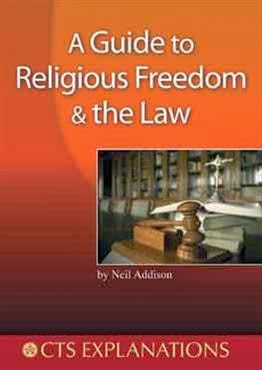The judgment of the US 9th Circuit Court of Appeals in the case of Catholic League v San Francisco makes interesting reading. In this case the Catholic League which is an organisation defending Catholic freedom in the US sued the City of San Francisco over a resolution passed by the Board of Supervisors (in effect the City Council) of San Francisco.
The City of San Francisco has a long record of supporting Gay Rights including same sex marriage and same sex adoption. Following a statement by Cardinal William Levada the head of the Vatican Congregation for the Doctrine of the Faith which condemned same sex adoption and stated that Catholic Adoption Agencies should not co-operate in any way with it the SF Board of Supervisors passed a lengthy resolution (no 168-06 It can be read on p4 of the Judgment). This resolution firmly disagreed with the views of Cardinal Levada and called on him to withdraw and on the present Archbishop of San Francisco, Archbishop Niederauer, to defy the Catholic Churches teaching on same sex adoption
WHEREAS, The Board of Supervisors urges Archbishop Niederauer and the Catholic Charities of the Archdiocese of San Francisco to defy all discriminatory directives of Cardinal Levada;
now, therefore, be it RESOLVED,
That the Board of Supervisors urges Cardinal William Levada, in his capacity as head of the Congregation for the Doctrine of the Faith at the Vatican (formerly known as Holy Office of the Inquisition), to withdraw his discriminatory and defamatory directive that Catholic Charities of the Archdiocese of San Francisco stop placing children in need of adoption with homosexual households.
The Catholic League argued that this resolution breached the 1st Amendment to the US Constitution which prevents an "establishment of religion". It was argued by the League that just as and, as the 1st Amendment prevents government in the US from endorsing any particular religion or religious group so it also prevents government from criticising any particular religion or religious group.
Much of the case revolved around the question of "standing". Clearly either Archbishop Niederauer or Cardinal Levada could claim that the resolution affected them but the Court had to decide whether the 2 Catholic League members in whose name the case was brought could claim that it affected them in their personal capacity as Catholics. The Court decided, by a bare majority that they did have standing.
The Court also by a majority decided that the resolution did not affect the rights of Catholics under the 1st Amendment. The minority dissenting view was set out in the judgment of Judge Kleinfield (p17 of PDF) who held that
government has no legitimate role under the Establishment Clause in judging the religious beliefs of the people — either by praise or denunciation.
The majority view was set out in the judgment of Judge Silverman (p26 of PDF) who said
Government speech or conduct violates the Establishment Clause’s neutrality-only requirement when it: (1) has a predominantly religious purpose; (2) has a principal or primary effect of advancing or inhibiting religion; or (3) fosters excessive entanglement with religion. .......It [the resolution] was an isolated, non-binding expression of the Board of Supervisors’ opinion on a secular matter, which the plaintiffs have not alleged even potentially interfered with the inner workings of the Catholic Church......We would have a different case on our hands had the defendants called upon Cardinal Levada to recant his views on transubstantiation, or had urged Orthodox Jews to abandon the laws of kashrut, or Mormons their taboo of alcohol. Those matters of religious dogma are not within the secular arena in the way that same-sex marriage and adoption are
An interesting point for me, as a non US lawyer, was that nobody referred to the right of free expression which is also part of the 1st Amendment since it does seem to me that the SF resolution was an expression of opinion by the SF Board of Supervisors and therefore surely it too was protected by the 1st Amendment on those grounds. I suppose that since the Court held that the establishment clause in the 1st Amendment was not violated they did not need to go on to consider freedom of speech issues.
On a personal basis I agree with the Court on their judgment (no doubt they will be heartily relieved to know that !). Whilst I can understand the annoyance of the Catholic League with what the SF resolution said the fact is that the biggest threat Christianity faces in the west is the restriction on freedom to express unpopular views and therefore supporting freedom of expression is important even when you disagree with what is expressed.
On a second personal point I do take issue with the SF resolution when it refers to the Congregation for the Doctrine of the Faith at the Vatican (formerly known as Holy Office of the Inquisition
that really is just a nasty attempt to blacken by association. The inquisition ceased to exist in 1908 so why over 100 years later refer to it when dealing with what a modern department has said; nobody refers to Canada (formerly known as British North America) or The Ministry of Defence (formerly known as the War Office). It was a childish remark by the SF Board but, as I have already mentioned, one protected by the 1st Amendment
Subscribe to:
Post Comments (Atom)



No comments:
Post a Comment